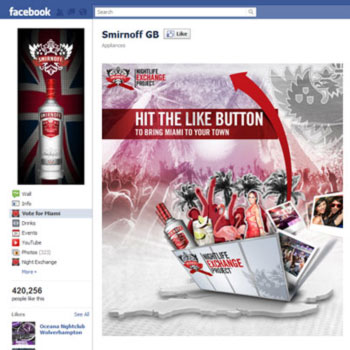Blog
Search
Diageo-Facebook Deal will Blanket Underage Youth with Alcohol Promotion
- Details
- Created: Tuesday, October 04 2011 15:22
 The ties between Big Alcohol and social media just keep growing stronger. In September, the world’s largest alcohol company, Diageo, and the world’s largest social network, Facebook, entered into a landmark partnership intended to bring unprecedented amounts of alcohol advertising to Facebook users. This new youth-oriented alcohol marketing partnership is the first of its kind in social networking history.
The ties between Big Alcohol and social media just keep growing stronger. In September, the world’s largest alcohol company, Diageo, and the world’s largest social network, Facebook, entered into a landmark partnership intended to bring unprecedented amounts of alcohol advertising to Facebook users. This new youth-oriented alcohol marketing partnership is the first of its kind in social networking history.Facebook users include at least 250 million people under the age of 21, the legal drinking age in the United States. And advertising alcohol on Facebook works - as a result of its Facebook activity, Diageo reports its brands in the US have enjoyed a 20% increase in sales. We can’t help but wonder what age demographic those sales are coming from, especially since a recent study found that underage drinkers in the U.S. identified Smirnoff and Captain Morgan (top Diageo brands) as two of their favorite alcohol brands to drink. Study results also suggested that marketing influences choice of beverage for adolescents.
Such alarming statistics beg the question: is anyone regulating this harmful advertising? The short answer is: not so much. The industry wants us to believe that it can ‘self-regulate’ its own marketing and advertising practices. But as we found in our 2008 report on the ineffectiveness of self-regulation of spirits advertising, lack of oversight of alcohol advertising in the U.S. is left to, and benefits, the industry. Meanwhile, exposure to alcohol advertising contributes to higher levels of risky drinking behaviors in youth: earlier initiation of drinking and higher consumption among underage youth who drink. Youth in markets with greater alcohol advertising expenditures drink more; and each additional dollar spent on alcohol advertising raises the number of drinks consumed by three percent. (See our Fact Sheet on Alcohol Marketing and Youth for citations and more research on this issue.)
So there's a double-whammy: Diageo is not only spending tens of millions to reach young people where they spend a great deal of their time, but also simultaneously trying to present itself as responsible through the promotion of a set of voluntary alcohol advertising‘guidelines.' The newest addendum to industry's regulatory charade was released by the Distilled Spirits Council of the United States (DISCUS) – a D.C. based front group for the biggest of Big Alcohol spirits corporations, and of which Diageo is a primary funder. It is no coincidence that the DISCUS self-regulation announcement coincided precisely with the Facebook partnership announcement, as a smoke screen to deflect the criticism that inevitably arose with news of the deal.
The social media segment of DISCUS's already-ineffective self-regulations stakes the alcohol industry’s claim to branded alcohol promotion on websites, social networking sites, blogs, mobile communications, and in applications. While they advise alcohol marketers to restrict such messages to venues where at least 71.6 percent of the user audience is the legal drinking age or older, age-restricting mechanisms to ensure compliance are essentially ineffective.
Two years ago, Alcohol Justice director of research, Sarah Mart, co-authored the article Alcohol Promotion on Facebook which exposed the excessive amounts of alcohol marketing, and lack of regulation, on Facebook. Mart says, “We saw this train wreck coming two years ago. Now it’s here; Big Alcohol is spending more than ever before to exploit users, particularly young people, by digitally befriending them and seamlessly integrating alcohol brands into their online lives. Meanwhile, its industry front group keeps spinning the same old self-regulation rhetoric for members to hide behind.”
Its high time that regulators step up, and stop Big Alcohol’s continued attempts to buy its way into the lives of young people--attempts that have harmful, even deadly, consequences.
Help us hold Big Alcohol accountable for the harm its products cause.
| GET ACTION ALERTS AND eNEWS |
STAY CONNECTED    |
CONTACT US 24 Belvedere St. San Rafael, CA 94901 415-456-5692 |
SUPPORT US Terms of Service & Privacy Policy |
Copyright © 2026 Alcohol Justice. All Rights Reserved.
Joomla! is Free Software released under the GNU General Public License.


